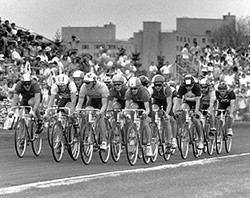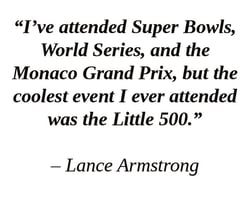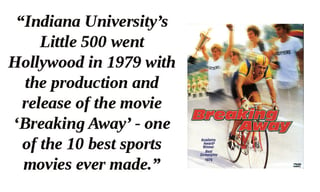Today we’re sharing insight from guest blogger Brad Serf, Principal at Gibson. We hope you enjoy Brad's wisdom and perspective.
 This weekend I will have the privilege to visit some old friends and memories. For the 30th time, I will attend Indiana University’s Little 500 - an event which began in 1951 to provide scholarships for working students.
This weekend I will have the privilege to visit some old friends and memories. For the 30th time, I will attend Indiana University’s Little 500 - an event which began in 1951 to provide scholarships for working students.
From the first race I attended as a high school senior in 1986, I knew I wanted to be involved and I haven’t outgrown it yet. Metaphorically speaking I’m somewhere on the backstretch of life approaching turn 3 and I find myself in a reminiscent state, perhaps even philosophical about this event.
 In many ways, The Little 500 imitates life. The thrill of victory and the agony of defeat combine every April during this 2-hour event. Fundamentally it is a bike race where 33 teams of 4 riders are tasked with riding around a quarter mile cinder track 200 times. Following a little over 2 hours of organized chaos, the first team to reach the finish line is declared the champion while 32 other teams lose. Seems pretty simple doesn’t it? Au contraire! If you have never been exposed to the Little 500, take a quick look at this promo video for the 2008 race.
In many ways, The Little 500 imitates life. The thrill of victory and the agony of defeat combine every April during this 2-hour event. Fundamentally it is a bike race where 33 teams of 4 riders are tasked with riding around a quarter mile cinder track 200 times. Following a little over 2 hours of organized chaos, the first team to reach the finish line is declared the champion while 32 other teams lose. Seems pretty simple doesn’t it? Au contraire! If you have never been exposed to the Little 500, take a quick look at this promo video for the 2008 race.
The high-risk, high-reward nature of this philanthropic event gave me many indelible life lessons about competition. Here are a few observations about optimal outcomes in Little 500 racing and optimal outcomes in business:
If you are going to compete, build a team worthy of winning. There are no pretenders on the podium at The Little 500. Yes, some teams will have good fortune and some will have misfortune on race day but teams that haven’t put in the work won’t do well. The field is too talented and they show no mercy on weak teams. I believe this is true in business, if you don’t build a winning team, the competition will overtake you.
Have enthusiasm for competition. Competitive people are attracted to winning teams and organizations, constantly hunting for an edge. It is no surprise that the Cutters and Black Key Bulls have a line of riders willing to join their teams. They have the formula for success and people want to be a part of that success. If your organization wants to attract the most talented and competitive professionals in your industry, try establishing a culture of competitive enthusiasm.
Position relative to the leader always matters. A momentary lapse in focus can cost you. To emphasize the point, watch the promo video a second time. “If you aren’t the lead sled dog the view never changes,” said Robert Benchley in The Road to Utopia. You are at risk when you are not the leader in your race or industry. No organization or team will be up front forever. What is important is that you know where you are relative to the leader and you are willing to work towards moving up. Being in the right spot at right time is possible. You need to know your relative position and act on it. Know your competition and seek to be better.
 You must be willing to work in relative obscurity. High performing teams don't just happen. Successful teams and organizations put in the work necessary to achieve optimal results. Much of this work is done in obscurity. In the case of a Little 500 rider, it might be in a dark basement on a trainer or a cold January day on the backroads of Monroe County. If you want to take your craft to the next level, you need to have a strategy and set incremental goals to reach it. Don’t expect to have a lot of encouragement along the way; most organizations want to hear about results not about your preparation.
You must be willing to work in relative obscurity. High performing teams don't just happen. Successful teams and organizations put in the work necessary to achieve optimal results. Much of this work is done in obscurity. In the case of a Little 500 rider, it might be in a dark basement on a trainer or a cold January day on the backroads of Monroe County. If you want to take your craft to the next level, you need to have a strategy and set incremental goals to reach it. Don’t expect to have a lot of encouragement along the way; most organizations want to hear about results not about your preparation.
If you think your generation has a better work ethic than the next generation you might be mistaken. Having been around 30 of these races now, I have watched 3 different generations compete for Little 500 glory. These student athletes demonstrate tremendous commitment and discipline throughout the year in preparation for this event and it transcends one’s date of birth. Times today are faster, the competitive fields are deeper, and the disciplined training has only increased. Working with about 25 millennials now, I believe it translates into the professional world too. The younger generations are hungry to compete too. Stay sharp Boomers and Gen Xers - the young guns are in pursuit.
What’s The Risk?
Competitive events and environments have a way of bringing out the best in us. If you don’t take some risk and step into the competitive arena, you may never know your full potential.
I once had a friend who frequently reminded me that “If you’re not getting beat, you’re not getting better” and I happen to think he was right. 32 teams will lose this Saturday. But each rider will take their experiences into the rest of their lives and be better for it. To me, that’s the essence of competition.
Competitive courage gives you the opportunity to achieve something beyond what you thought possible, beyond what you would have done without it. Who’s ready to go to Bloomington this weekend?
You didn’t ask, but my teams were 9th and 22nd in the years I competed in The Little 500. :-)
This content was written and shared by guest blogger, Brad Serf.
 Brad is a principal at Gibson with responsibility for providing risk management and insurance services to business clients. He specializes in identifying business, strategic, and hazard risk exposures. Brad consults with clients to develop and implement strategies to effectively and efficiently grow their business.
Brad is a principal at Gibson with responsibility for providing risk management and insurance services to business clients. He specializes in identifying business, strategic, and hazard risk exposures. Brad consults with clients to develop and implement strategies to effectively and efficiently grow their business.



